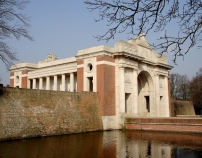| First Name: | Frederick | Last Name: | KIMBER | |
|---|---|---|---|---|
| Date of Death: | 13/06/1917 | Lived/Born In: | Barnes | |
| Rank: | Rifleman | Unit: | King's Royal Rifle Corps18 | |
| Memorial Site: | Menin Gate, Ypres | |||
Current Information:Age-19 27, Railway Side, Barnes
The Battle of Messines was a successful British offensive between 7th-14th June, 1917 that dislodged the German army from the Messines Ridge, a salient jutting into the British lines, that they had held since 1914. The front attacked ran south for nine miles from Mount Sorrel, through the villages of Messines and Wytschaete, down to Ploegsteert and its capture gave the British control of the high ground to the south of Ypres. This greatly facilitated their attack further north the following month which became known as the 3rd Battle of Ypres or Passchendaele. The success at Messines was a result of some careful planning and the explosion of nineteen large mines at zero hour on 7th June, along the length of the ridge. Twenty two mine shafts had been constructed but one was discovered by the enemy and destroyed and two failed to explode. Nevertheless the resulting explosion was so loud that it could be heard in London and so powerful that 10.000 German soldiers were killed. Nine British, Australian and New Zealand divisions then attacked behind a creeping artillery barrage and all first day objectives were soon taken. Over the next few days German counter attacks were repelled and by 14th June the whole of the ridge had been captured. On 7th June, 41st Division attacked in the northern part of the battle front with its first objective being the Damstrasse, a road that ran from St. Eloi down towards Wytschete. 18th King’s Royal Rifle Corps of 122 Brigade were in reserve for this attack and were employed as carrying parties taking ammunition and other supplies forward across No-Man’s-Land to the forward troops. On 12th June they took over the new front line with battalion HQ at the White Chateau. The following day, 13th June, there was a great deal of artillery activity by both sides and 18th King’s Royal Rifle Corps suffered very badly with eleven men killed and another eighteen wounded. Frederick Kimber was one of those killed. |
||||
| « Back to Search Results | ||||
| If you think any of the information shown here is incorrect, Click Here to submit your amends and comments | ||||




